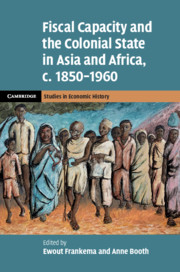Book contents
- Fiscal Capacity and the Colonial State in Asia and Africa, c. 1850–1960
- Cambridge Studies in Economic History
- Fiscal Capacity and the Colonial State in Asia and Africa, c. 1850–1960
- Copyright page
- Contents
- Figures and Maps
- Tables
- Contributors
- Acknowledgements
- 1 Fiscal Capacity and the Colonial State: Lessons from a Comparative Perspective
- 2 Towards a Modern Fiscal State in Southeast Asia, c. 1900–60
- 3 Why Was British India a Limited State?
- 4 Colonial and Indigenous Institutions in the Fiscal Development of French Indochina
- 5 Fiscal Development in Taiwan, Korea and Manchuria: Was Japanese Colonialism Different?
- 6 From Coast to Hinterland: Fiscal Capacity Building in British and French West Africa, c. 1880–1960
- 7 New Colonies, Old Tools: Building Fiscal Systems in East and Central Africa
- 8 Local Conditions and Metropolitan Visions: Fiscal Policies and Practices in Portuguese Africa, c. 1850–1970
- 9 How Mineral Discoveries Shaped the Fiscal System of South Africa
- Index
- References
1 - Fiscal Capacity and the Colonial State: Lessons from a Comparative Perspective
Published online by Cambridge University Press: 15 November 2019
- Fiscal Capacity and the Colonial State in Asia and Africa, c. 1850–1960
- Cambridge Studies in Economic History
- Fiscal Capacity and the Colonial State in Asia and Africa, c. 1850–1960
- Copyright page
- Contents
- Figures and Maps
- Tables
- Contributors
- Acknowledgements
- 1 Fiscal Capacity and the Colonial State: Lessons from a Comparative Perspective
- 2 Towards a Modern Fiscal State in Southeast Asia, c. 1900–60
- 3 Why Was British India a Limited State?
- 4 Colonial and Indigenous Institutions in the Fiscal Development of French Indochina
- 5 Fiscal Development in Taiwan, Korea and Manchuria: Was Japanese Colonialism Different?
- 6 From Coast to Hinterland: Fiscal Capacity Building in British and French West Africa, c. 1880–1960
- 7 New Colonies, Old Tools: Building Fiscal Systems in East and Central Africa
- 8 Local Conditions and Metropolitan Visions: Fiscal Policies and Practices in Portuguese Africa, c. 1850–1970
- 9 How Mineral Discoveries Shaped the Fiscal System of South Africa
- Index
- References
Summary
This chapter introduces and motivates the main theme of the book and the key questions related to the development of fiscal capacity in colonial Asia and Africa. We situate the colonial fiscal state in the context of the changing world order in the long century between 1850 and 1960. We discuss the historiography and existing theoretical perspectives on fiscal development, arguing that these remain biased towards the European, or Eurasian experience at best. We also summarize the key insights of all the chapters in light of the general patterns that emerge from the comparative perspective adopted in this book. Finally, we formulate a brief future research agenda which identifies the next steps to be taken to improve our understanding of the various ways in which fiscal states have developed across the globe since the mid-nineteenth century.
Keywords
- Type
- Chapter
- Information
- Publisher: Cambridge University PressPrint publication year: 2019

